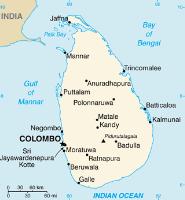NEW YORK -- Sri Lanka, celebrating its 60th anniversary of independence from British colonial rule this year, is using a carrot-and-stick strategy in the war that has enveloped the island nation for some 25 years and brought it to the brink of economic disaster. The country's government has achieved some initial success in containing the home-grown terrorism perpetrated by the Liberation Tigers of Tamil Eelam (LTTE), commonly known as the Tamil Tigers, as it tries to wean away the Tamil population from supporting the LTTE's agenda of carving out an independent state in the northern and eastern parts of the island. Rohitha Bogollagama, Sri Lankan foreign minister, was recently in New York to canvass for a seat for Sri Lanka on the United Nations Human Rights Council (UNHRC) -- six Asian nations Bahrain, East Timor, Japan, Pakistan, South Korea and Sri Lanka are competing for four Asian seats. During the visit, he also visited the Asia Society, where he told the media that peace was returning to the island nation, thus bringing an end to the human casualties and economic setbacks that have resulted from the conflict with the LTTE.
Sri Lankan Government Must Balance Carrots and Sticks to End Conflict

